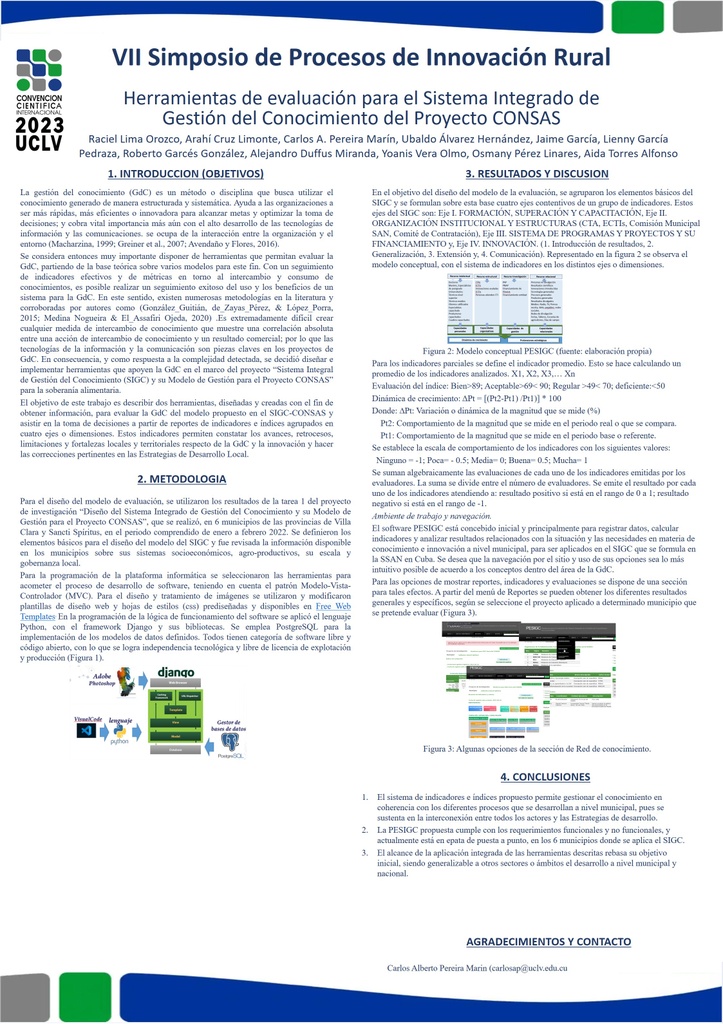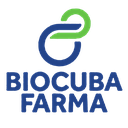Executive Secretary

9th International Scientific Conference on Agricultural Development and Sustainability
7th Symposium of Rural Innovation Processes

Abstract
Abstract: Many organizations use metrics for monitoring concrete data showing the operational performance of their processes or the assignment of resources, and with much more emphasis with the support of information technologies. Effective monitoring of these metrics regards the exchange and consumption of knowledge allows a successful application of a Knowledge Management System to achieve strategic objectives. This article describes two tools to assist in decision-making, based on the evaluation of the Integrated Knowledge Management System (IKMS) for the CONSAS project for Food Sovereignty, Food and Nutrition Security. For the design and implementation of these are taken as a basis the results of the National Consultancy “Design of the food production chain, carried out in 6 municipalities of two Cuban provinces. First result is the model of indicators for the evaluation of the IKMS, where basic elements are established regards four axes, which result in qualitative indices and whose analysis allows pertinent corrections to be made in the Local Development Strategies. The other tool is a free software digital platform, where this metric is implemented, in addition to facilitating the knowledge management itself and attention to requests for demands of some type to groups of catalysts based on the objectives that need to be interacted with. The scope of these integrated application of these tools exceeds its initial objective, to be generalize to other sectors or areas of development at the municipal and national level.
Resumen
Muchas organizaciones utilizan métricas para monitorear datos concretos que muestran el rendimiento operativo de sus procesos o la asignación de recursos, y con mucho más énfasis con el apoyo de las tecnologías informáticas. Un seguimiento efectivo de estas métricas en torno al intercambio y consumo de conocimientos, permite una aplicación exitosa de un Sistema de Gestión del Conocimiento para alcanzar los objetivos estratégicos. En este artículo se describen dos herramientas para asistir en la toma de decisiones, a partir de la evaluación del Sistema Integrado de Gestión del Conocimiento (SIGC) para el proyecto CONSAS para la Soberanía Alimentaria Seguridad Alimentaria y Nutricional. Para el diseño e implementación de estas se toman como base los resultados de la Consultoría Nacional “Diseño del en la cadena de producción de alimentos, realizada en 6 municipios de dos provincias cubanas. Un resultado es el modelo de indicadores para la evaluación del SIGC, donde se establecen elementos básicos en torno a cuatro ejes, que derivan en índices cualitativos y cuyos análisis permiten hacer las correcciones pertinentes en las Estrategias de Desarrollo Local. La otra herramienta es una plataforma digital en software libre, donde se implementa esta métrica, además de facilitar la propia gestión del conocimiento y la atención a solicitudes de demandas de algún tipo a grupos de catalizadores en función de los objetivos que se necesita interactuar. El alcance de la aplicación integrada de estas herramientas rebasa su objetivo inicial, siendo generalizable a otros sectores o ámbitos el desarrollo a nivel municipal y nacional.
About The Speaker

M. Sc. Carlos Alberto Pereira Marín

Discussion

